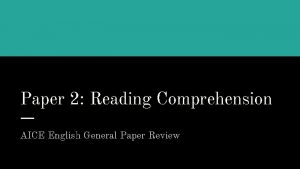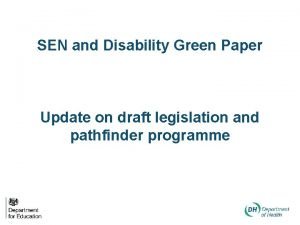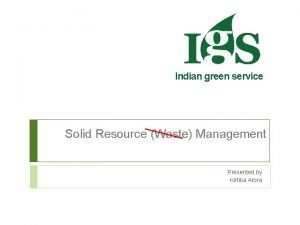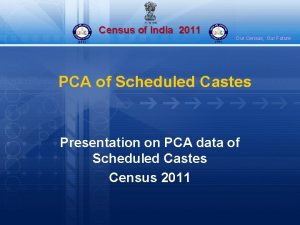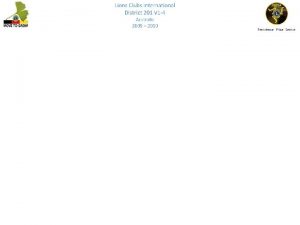Our Health Our Health Service Green Paper on













- Slides: 13

Our Health, Our Health Service Green Paper on NHS quality, governance, and functions.

Purpose of the Green Paper To stimulate debate and seek views on: • The legislation that may be required to help further improve the quality of healthcare services in Wales, and • Whether any legislation is needed in order to bring the current NHS governance structures up to date and ensure its functions are fit for purpose, following the last major health reforms of 2009. The three key themes we are focussing on: Quality – providing the right care, in the right place, at the right time and in the right way. Governance – the management, monitoring, decision making process and accountability of organisations. Functions – the activities and services of organisations.

Context Looking to build on what we’ve already achieved: Quality already forms part of the core values underpinning the NHS in Wales. Examples of building blocks already in place: • Duty of Quality in The Health and Social Care (Community Health and Standard) Act 2003 • The Health and Care Standards 2015 • Achieving Excellence: The Quality Delivery Plan for the NHS in Wales 2012 -2016 • The NHS (Concerns, Complaints and Redress Arrangements) (Wales) Regulations 2011 Now we need to look at how we can improve further and whether legislation is required to do so.

Chapter 1 – The Changing Shape of Health Services Wales is moving towards a system of preventative healthcare, where public services work together and with their communities to identify and meet the local populations needs. This theme has featured in: Welsh NHS • The Well-being of Future Generations (Wales) Act 2015 • The Social Services and Well-being (Wales) Act 2014 • The Primary Care Plan for Wales “Health boards should continuously engage with their local communities to help them plan and develop healthcare and services, not only when undertaking major service change. ” Ann Lloyd CBE Social Services Other s Service We are seeking views on how legislation could be used to ensure collaboration between service providers and the local population to plan services to best meet people’s health and wellbeing needs.

Chapter 2 – Enabling Quality The existing Duty of Quality does not align with the integrated system of health care in Wales today and focuses largely on hospitalbased care. Everyone, working at every level, has a part to play in driving up standards of safe, effective, patient-centred care. The Integrated Medium Term Planning framework is a key driver for ensuring quality and learning form an integral part of health service plans. The system for accountability of leaders in ensuring quality also needs to be considered. We are seeking views on how legislation could be used to engrain a culture of quality, specifically looking at the duty of quality, “responsible individuals”, “fit and proper persons tests”, and promoting quality through the NHS planning framework.

Chapter 3 – Quality in Practice We might want to make the quality of services measurable for service providers. Currently there are different sets of standards for the NHS and Independent healthcare services: • The NHS is not legally obliged to meet the Health and Care Standards (published April 2015). • Independent healthcare services are required to meet the National Minimum Standards (published April 2011). Clinical peer supervision enables learning though guided reflection on staff experiences. Currently there is no consistent application of this helpful tool. “The Welsh Government should ensure that only one set of health standards applies across the NHS and independent sectors… a coherent set of standards that link with social care standards. ” Ruth Marks We want to know how we can best drive quality; whether common standards should be aligned and apply to both the NHS and independent sector in Wales, and how peer review and clinical supervision could be made available for all health professionals.

Chapter 4 – Openness and Honesty in all we do The NHS in Wales has made real progress in promoting openness and being candid about its performance. Examples of the good work already underway: • My Local Health Service website launched in 2013 • The Annual Quality Statement for NHS Wales 2014 • Putting Things Right Guidance – being reviewed in 2015 Now we want to take this further! A duty of candour could help… Moving towards a culture of coproduction requires being open and honest with the public at all times, regardless of whether a complaint has been made. “Every employee should be the guardian of truth and honesty in any organisation…” Keith Evans We are seeking views on how legislation, including a duty of candour, could be used to enhance openness, transparency, and honesty in healthcare settings, and improve joint investigations of complaints across the NHS and social services in Wales.

Chapter 5 – Better Information, Safely Shared The need for NHS organisations to share patient information is key to providing quality services as part of a joined up, integrated system. By effectively sharing and disseminating information, we can provide the most effective treatment, tailored to the individual needs of each patient while reducing the risk of harm. The processing or sharing of patient identifiable information for non-direct patient care purposes, such as research, could also be in the interest of improving health and wellbeing of people in Wales. We want to know what is preventing healthcare bodies from sharing patient information and how these issues can be resolved. We also want views on the collection and sharing of patient identifiable information for other purposes, such as research.

Chapter 6 – Checks and Balances Now is the time to consider the third line of defence and how we can best: • Assure the public about the quality of care being delivered. • Take action where health organisations have failed to resolve identified issues. • Effectively represent the patient voice. “…how could Wales move towards ‘world class’ patient and public engagement, “As part of the proposals for ensuring the best influence for the Green Paper, Welsh patients over the care they Government should consult receive, and services which are on… the range of options truly designed for the needs which would make HIW a more and wishes of all our independent inspectorate… At communities? ” the same time it would be Professor Marcus Longley sensible to take into account the possible merger with CSSIW…” Ruth Marks We are seeking views on how to best improve the independence of HIW, including whether we should consider merging HIW and CSSIW. We also want opinions on what changes are required to enable CHCs to best represent patients and the public.

Chapter 7 – NHS Finance, Functions and Planning There are differences between the powers and functions of health boards and NHS trusts set out in the NHS (Wales) Act 2006, such as: • Health boards do not have borrowing powers. NHS Trusts do. • NHS trusts and health boards in Wales prepare individual annual statutory accounts. Health boards’ accounts are consolidated within the Welsh Government statutory accounts. NHS trusts’ accounts are not. • Health boards are under a statutory obligation to plan services. NHS trusts are not. Achieving consistency of powers and obligations between health boards and NHS trusts may be an important factor in enabling organisations to continue to grow, deliver and be accountable. We are seeking views on: Whether to give health boards borrowing powers; Whether legislative changes should be made to provide greater flexibility regarding summarised accounts for NHS organisation in Wales; and Whether to review planning duties on NHS trusts and health boards.

Chapter 8 – Leadership, Governance and Partnerships Good governance is largely a matter of strong leadership, consistent culture and clear direction underpinned by having robust processes in place. We want to look at areas where we can improve. • The existing governance framework could be developed further to support and drive improvement. • Health board and NHS trust board membership could be reviewed to ensure the boards are fit for the present and future challenges facing the NHS in Wales. • The role of the Board Secretary may require greater statutory clarity. “We recommend that the Welsh Government should… review the current number, representation and appointment process of independent members of LHBs…” Commission on Public Service Governance and Delivery We are seeking views on what measures, including legislative, might be taken in order to strengthen leadership, governance, and partnerships.

Chapter 8 continued… • The Welsh Government, NHS Wales, and other expert stakeholders are routinely working closely together. This calls into question the need for advisory committees that currently provide expert clinical advice to the Welsh Government. • Current arrangements for decision making in relation to NHS workforce matters may need to be revised to better reflect the devolved nature of the healthcare services in Wales. • Better clarity may be required for hosted services and joint ventures for health boards and NHS trusts. “…building on the achievements of NHS Wales Shared Services Partnership, a single shared services operation must be established to provide back office functions and common services across the public sector…” Commission on Public Service Governance and Delivery We are seeking views on how legislation could be used to: Ensure policies and services are based on expert professional advice; Reflect our prudent healthcare approach in partnership working arrangements; Provide clarity for hosted, joint, and shared services; and Improve flexibility for NWSSP to take public services-wide shared services role.

Responding to the Consultation As the outcome of the consultation has potential to inform legislation in the future, we want to encourage as many views and responses as possible! Send your responses to: HQDMailbox@wales. gsi. gov. uk Or Matthew Tester Healthcare Quality Division Health and Social Services Group Welsh Government Cathays Park Cardiff CF 10 3 NQ
 Green green green red
Green green green red Green paper children's mental health
Green paper children's mental health Paper 2 aice general paper
Paper 2 aice general paper Discursive prompts
Discursive prompts Sen green paper
Sen green paper Lernpyramide von green & green (2005)
Lernpyramide von green & green (2005) Green yellow blue
Green yellow blue Frc control system
Frc control system Poem tissue
Poem tissue Indian green service
Indian green service Army green service uniforms
Army green service uniforms Thinking affects our language which then affects our
Thinking affects our language which then affects our Our census our future
Our census our future Words to christ be our light
Words to christ be our light


